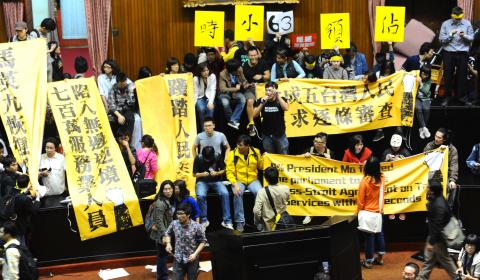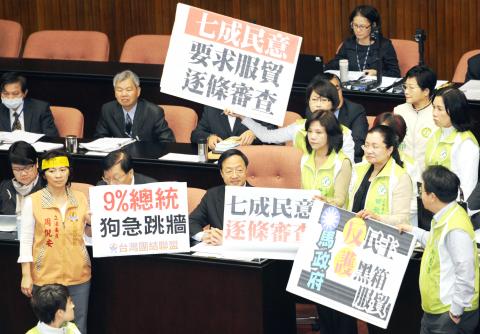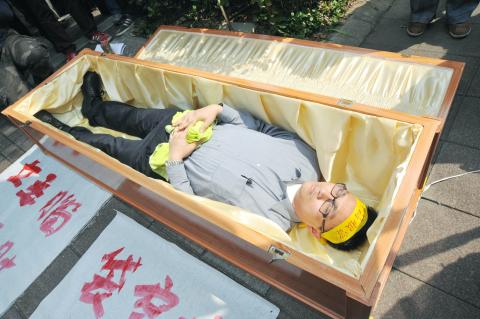Opposition parties and civic groups are working together on a full-scale protest that includes legislative boycotts, a “siege” of the legislature and street rallies after the Chinese Nationalist Party (KMT) cut short the review of the cross-strait service trade agreement on Monday and sent the pact directly to the plenary session for its second reading.
At about 9pm, more than 300 students and demonstrators broke from the rally outside the Legislative Yuan, broke into the compound and took over the podium on the legislative floor.
The police did not evacuate the protesters.

Photo: Chang Chia-ming, Taipei Times.
The protesters staged a sit-in in the assembly hall where lawmakers hold meetings, saying that they would stay there until Friday and until the KMT withdraw the agreement from the plenary.
The protesters called on supporters to bring supplies to the site.
The KMT caucus has breached a previously reached inter-party consensus that the pact — which experts said could severely affect local industries — must be reviewed clause-by-clause in the Legislative Yuan, which has infuriated the public, the opposition said, adding that the move amounted to contempt of parliament and a betrayal of democratic principles.

Photo: Lo Pei-der, Taipei Times
In response, the Democratic Progressive Party (DPP) and the Taiwan Solidarity Union (TSU) boycotted the Legislative Yuan’s plenary session yesterday, forcing Legislative Speaker Wang Jin-pyng (王金平) to announce an adjournment for party negotiations.
Opposition parties vowed to continue boycotting the plenary until the KMT retracts the agreement.
With President Ma Ying-jeou’s (馬英九) administration and the KMT showing no signs of retracting the agreement, DPP Chairman Su Tseng-chang (蘇貞昌) yesterday said the party would launch a series of “countermeasures” against the KMT over the next three days.

Photo: Mandy Cheng, AFP
The DPP said that it would propose a “better agreement” than the current service trade pact in its Central Standing Committee meeting today and convene a meeting with representatives from various industries and civic groups tomorrow to discuss the establishment of an alliance to monitor the review of the agreement.
In addition, the party plans to launch a campaign to “besiege” the Legislative Yuan.
“Our goal to review the pact clause-by-clause and to renegotiate the deal remains unchanged,” Su said.
The TSU is mobilizing its supporters and industry representatives to “besiege” the Legislative Yuan on Friday, with TSU Chairman Huang Kun-huei (黃昆輝) accusing the KMT of breaching the consensus, which Huang called unacceptable.
Speaking to reporters after the plenary session yesterday, Wang said that although the KMT’s handling of the review surprised him, he would not speculate on what the pan-blue and pan-green camps would do next week.
While another round of inter-party negotiation is needed, “the atmosphere is not appropriate for both camps to sit down and talk at this moment,” Wang said.
At separate press conferences, DPP caucus director-general Gao Jyh-peng (高志鵬) said that the party would continue boycotting plenary sessions until the KMT offers a concession, while DPP Deputy Secretary-General Lee Chun-yi (李俊毅) insisted that the agreement should stay in the committee and be reviewed line-by-line.
Former premier Frank Hsieh (謝長廷) of the DPP posted on Facebook that he supported an “all-out protest” in collaboration with the public against the KMT.
Dozens of civic group representatives and students, who have had been camping outside the Legislative Yuan since Monday, stepped up their mobilization efforts, urging the public to join the sit-in and an overnight rally to voice their opposition to what they called the KMT’s “brutal” decision that had completely ignored the interests of the Taiwanese.
DPP lawmakers Hsiao Bi-khim (蕭美琴), Wu Yi-chen (吳宜臻) and Wu Ping-jui (吳秉叡) also staged a 70-hour hunger strike, which began at noon yesterday and would last until 10am on Friday, when a plenary session is scheduled to commence.
The protest in front of the Legislative Yuan would continue until Friday, according to Lai Chung-chiang (賴中強), convener of the Democratic Front Against the Cross-strait Trade in Services Agreement and spokesperson of the rally.
Beginning yesterday morning, the police have reinforced deployment and have installed a road block around the Legislative Yuan compound to keep the protesters from entering the compound and to prepare for the planned siege on Friday.

NATIONAL SECURITY THREAT: An official said that Guan Guan’s comments had gone beyond the threshold of free speech, as she advocated for the destruction of the ROC China-born media influencer Guan Guan’s (關關) residency permit has been revoked for repeatedly posting pro-China content that threatens national security, the National Immigration Agency said yesterday. Guan Guan has said many controversial things in her videos posted to Douyin (抖音), including “the red flag will soon be painted all over Taiwan” and “Taiwan is an inseparable part of China,” while expressing hope for expedited “reunification.” The agency received multiple reports alleging that Guan Guan had advocated for armed reunification last year. After investigating, the agency last month issued a notice requiring her to appear and account for her actions. Guan Guan appeared as required,

Japan and the Philippines yesterday signed a defense pact that would allow the tax-free provision of ammunition, fuel, food and other necessities when their forces stage joint training to boost deterrence against China’s growing aggression in the region and to bolster their preparation for natural disasters. Japan has faced increasing political, trade and security tensions with China, which was angered by Japanese Prime Minister Sanae Takaichi’s remark that a Chinese attack on Taiwan would be a survival-threatening situation for Japan, triggering a military response. Japan and the Philippines have also had separate territorial conflicts with Beijing in the East and South China

A strong cold air mass is expected to arrive tonight, bringing a change in weather and a drop in temperature, the Central Weather Administration (CWA) said. The coldest time would be early on Thursday morning, with temperatures in some areas dipping as low as 8°C, it said. Daytime highs yesterday were 22°C to 24°C in northern and eastern Taiwan, and about 25°C to 28°C in the central and southern regions, it said. However, nighttime lows would dip to about 15°C to 16°C in central and northern Taiwan as well as the northeast, and 17°C to 19°C elsewhere, it said. Tropical Storm Nokaen, currently

PAPERS, PLEASE: The gang exploited the high value of the passports, selling them at inflated prices to Chinese buyers, who would treat them as ‘invisibility cloaks’ The Yilan District Court has handed four members of a syndicate prison terms ranging from one year and two months to two years and two months for their involvement in a scheme to purchase Taiwanese passports and resell them abroad at a massive markup. A Chinese human smuggling syndicate purchased Taiwanese passports through local criminal networks, exploiting the passports’ visa-free travel privileges to turn a profit of more than 20 times the original price, the court said. Such criminal organizations enable people to impersonate Taiwanese when entering and exiting Taiwan and other countries, undermining social order and the credibility of the nation’s